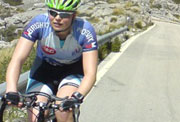 The weekend has been and gone, and last week’s anxiousness is a thing of the past. There were no fireworks at the time trials, but after two good and solid performances I can estimate realistically what the state of things is.
The weekend has been and gone, and last week’s anxiousness is a thing of the past. There were no fireworks at the time trials, but after two good and solid performances I can estimate realistically what the state of things is.
I rode well enough to take a decent amount of confidence from these, and last but not least if I had any niggling doubts about the coach, they’ve now been put to rest. I’d like to think that I’m quite a logically minded person, after all I’m a physicist! But that doesn’t stop me from questioning the wisdom of what the coach prescribes me occasionally. Especially after doing my own thing for so many years, and being fairly successful with this approach.
One of the other reasons I love time trialling is that I actually made a profit. 2 entries = £16, winning both the ESCA 10 & 25 and therefore the combined weekend = £32. But what about petrol, you ask? Well, I’m Ironman training. I can’t afford to give up a whole weekend’s worth of training for two rather short races. Luckily I found someone to give my race wheels a lift to the race head quarters so I could ride out and back, and that way I managed a good 80 km and 110 km on the bike for those two days. It also ensured that I got a good warm up which usually equals a better race. As a general rule: The shorter the race, the longer the warm up. The simple explanation is that the shorter the race is the higher the intensity will be, and hence the need for a more thorough warm up of the engine.
Personally I can spot a clear trend with my time trial performances and the amount of warming up I’ve done. I always describe a 10 mile time trial as 24 minutes of borderline being sick. They hurt. You haven’t really got the time to build into a ride like that. Interestingly I know a fair few triathletes who outperform me on the bike in any triathlon, but don’t come very close to me in a time trial. I’ve come to the conclusion that there is somewhat of an art to being able to hurt on the bike, and being able to really reach your true maximum. For example a lot of people will say that their maximum heart rate differs on bike and run. Physiologically this doesn’t make sense. It’s the same heart, the maximum number of beats it can perform per minute is one number. What does differ is how close to this maximum you can get. If you are truly efficient on the bike it shouldn’t be any different to running. This was always something I’ve aspired to achieve, and I think the fact I have is largely due to spending so much time riding my bike. (I guess I should thank the running injuries for something!)
So what’s the point of all this? Apart from me wanting to see more women riding their bikes in anger, I really think single sport racing is a useful building block in a triathlete’s training plan. They make you work harder than you ever will in any training session. You can test race equipment in a race-like environment without it being a race as such (single sport races are training sessions in my book) – be it nutritional products, or puncture repair kit. It also teaches you to deal with pre race nerves. And finally, if you’re anything like me: I love, love, love racing. I probably would be a couch potato if it wasn’t for competition, so of course any chance to do more of it is a bonus in my book!
So with that I’m going to leave you, after all the sun is shining so it’s time to get out of the house!
Lizzy
Comments are closed.